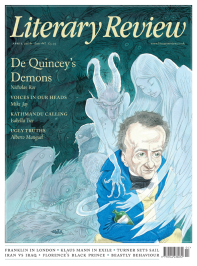Robert Irwin
Eastern Promises
This Orient Isle: Elizabethan England and the Islamic World
By Jerry Brotton
Allen Lane 358pp £20
Politics, commerce and drama mingle in this account of England’s relations with the Muslim world in the 16th century. Queen Elizabeth and her counsellors were chiefly concerned to find allies who might join England in its struggle against Catholic Spain, ruled by the Habsburgs. At first the Ottoman Turkish sultans, the Moroccan Sa‘did sharifs and the Safavid shahs of Persia were disinclined to take England seriously as a military power. Although the English victory over the Spanish Armada in 1588 changed perceptions, the political quest for a military alliance against the Habsburgs never came to much. But diplomatic and military démarches ran in tandem with commercial negotiations and in Jerry Brotton’s This Orient Isle it is commerce that receives the most attention. The Muscovy Company (chartered in 1555), the Turkey Company (1581), the East India Company (1600) and others sought to export English broadcloth, tin, lead and firearms to the Islamic lands in exchange for silks and other textiles, as well as spices. Critics of trade with the infidel (and there were many) dismissed the imports from the Orient as mere fripperies and questioned the morality of selling weapons to Muslims. International commerce in the 16th century was a hazardous business. The daring and conscientious men who combined trade with diplomacy, such as William Harborne in Istanbul, Edmund Hogan in Morocco and Anthony Jenkinson, who led trade missions through Muscovite territory to Persia, emerge as heroes in Brotton’s carefully researched narrative.
But the world of international commerce and diplomacy had its dodgy side as well and some merchants doubled as buccaneers. There were also chancers, charlatans, remittance men and renegades. The Sherley brothers command the most attention. In large part, this was because of their enormous talent for publicising themselves, though

Sign Up to our newsletter
Receive free articles, highlights from the archive, news, details of prizes, and much more.@Lit_Review
Follow Literary Review on Twitter
Twitter Feed
It wasn’t until 1825 that Pepys’s diary became available for the first time. How it was eventually decrypted and published is a story of subterfuge and duplicity.
Kate Loveman tells the tale.
Kate Loveman - Publishing Pepys
Kate Loveman: Publishing Pepys
literaryreview.co.uk
Arthur Christopher Benson was a pillar of the Edwardian establishment. He was supremely well connected. As his newly published diaries reveal, he was also riotously indiscreet.
Piers Brendon compares Benson’s journals to others from the 20th century.
Piers Brendon - Land of Dopes & Tories
Piers Brendon: Land of Dopes & Tories - The Benson Diaries: Selections from the Diary of Arthur Christopher Benson by Eamon Duffy & Ronald Hyam (edd)
literaryreview.co.uk
Of the siblings Gwen and Augustus John, it is Augustus who has commanded most attention from collectors and connoisseurs.
Was he really the finer artist, asks Tanya Harrod, or is it time Gwen emerged from her brother’s shadow?
Tanya Harrod - Cut from the Same Canvas
Tanya Harrod: Cut from the Same Canvas - Artists, Siblings, Visionaries: The Lives and Loves of Gwen and Augustus John by Judith Mackrell
literaryreview.co.uk